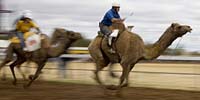Camel in the Outback

 5:10
Larry Massett & Jake Warga
5:10
Larry Massett & Jake Warga
Wild camels in Northern Australia.
Broadcast: Dec 8 2006 on NPR All Things Considered Subjects: International, Travel, Food, Environment, Sports
Wild Camels Run Amok in Australia's Outback
December 8, 2006 from All Things Considered
ROBERT SIEGEL, host: Most countries have to deal with non-native species. Here, we have kudzus, zebra mussels, Asian tiger mosquitoes. Well, in Australia, they have some guests that demand a little more attention than that.
Wild camels roam the country, as independent producer Larry Massett discovered. (Soundbite of camel) LARRY MASSETT: Some people donít like camels. They bite. They kick. They stink. They are dirty. And above all, there are too many of them, in Australia anyway. There are hoards of feral camels roaming the outback Ė 700,000 Ė doubling every decade, shiftless descendants of the hardworking Dromedaries brought over in the 19th Century before the roads and rails came in. When their services were no longer required, they were let go. It turns out, who knew camels thrive in the dessert. (Soundbite of camel) Well, not as aggravating as the feral rabbits or cane toads or other run amok species. Still, what to do with them? (Soundbite of cheering) Race them. Of course, race them. Why not? This is the annual Camel Cup race in Alice Springs in the Northern Territory. A dozen camels are galumphing around the track as the crowd hags them on. Itís not dead serious. Most of these animals are just the local tourism camels. They know how to walk gentle and not bite children or kick retired schoolteachers. Getting them to line up for the start of a race is another matter. (Soundbite of camel) They donít like it one bit. And then - (Soundbite of gunshot) When they do takeoff, some go straight, some go sideways, some go backwards, riders fall off and - what the heck. This is good family fun, good with beer too. Unidentified Woman: This oneís Phoebe. Hello. He was down in streets of Sydney, upside down at sunrise and they got Ė theyíre here to be rescued. MASSETT: The trouble over using camels for fun is you donít use very many. A trained, tourist friendly camel will be kept for many years, very little turnover here. You kind of want something more drastic, more camel consuming. Maybe, you could eat them. At the slaughterhouse he runs a little north of Alice Springs, Gary Dan is watching camels come down the disassembly line. First, theyíre stunned, then beheaded, then skinned, eviscerated and fairly taken apart, even the hump, which is not, as often imagined, full of water. Mr. GARY DAN: Itís a beautiful white, soft back on the camel. Theyíre going to save its lovely white back. And for cooking, they rise and they put on moisture. At the moment, we just throw it out. MASSETT: This is grizzly work, but you can get used to it. When itís time for lunch, Gary grabs a couple of very, very fresh steaks and strolls out to the grill. Mr. DAN: So just a little bit of salt on that one. Just a little bit of pepper and weíll flop it on the barbecue. MASSETT: Tastes just like beef, he says. Low fat, low cholesterol, excellent. Gary likes camel a lot. But he can sell only about 20 a week. Most Australians wonít touch the stuff. Folks in the Middle East or in Southeast Asia, who might eat them, just donít know that theyíre here. So anybody else got an idea? Mr. SAM WATKINS: My name is Sam Watkins. Weíre at (unintelligible), which is 120, approximately, kilometers south of Alice Springs. Iíve got six camels here. MASSETT: Sam loves camels. Mr. WATKINS: Their ability to reconcile what has happened to them in this period of captivity is incredibly. If I had been captured, castrated and was now held in a pen, Iíd be sitting in the corner rocking, or Iíd be gnashing my teeth. I donít think I would be taking food relatively contentedly from my captors. I really strongly believe that thereís a lot to be understood in these animals about how to think, how to live. MASSETT: Sam wants to use these wise camels to start a trekking business, where you walk around in the desert for weeks on end. It might conceivably make money Ė maybe. Mr. WATKINS: Itís a very obscure, marginal activity, but itís very good fun at the other side of it. Watching the camels in the dessert is just fun, fun, fun, fun, fun. (Soundbite of camel) For NPR News, Iím Larry Massett. SIEGEL: And you can see photos from the annual Camel Cup race and other camels in the outback at NPR.org.
